
BOBP is a Regional Fisheries Advisory Body (RFAB) of the countries bordering the Bay of Bengal region. It serves as the think tank on transboundary and contemporary national issues of the member countries concerning fisheries management.
We, at BOBP, are committed to accelerate the transformation of the fisheries sector of this region towards real-time, evidence-driven and ecosystem-based management, leveraging our global knowledge networks and effective partnership with the national governments and their constituent research and academic institutions.
Director
Bay of Bengal Programme
Inter-Governmental Organisation
(BOBP-IGO)
The BOBP-IGO undertakes policy research on national and international fisheries and environmental issues to inform and shape sustainable fisheries management in the region. If interested to join Bay of Bengal Policy Research Group (BOBPRG), a transdisciplinary team of experts please register here.
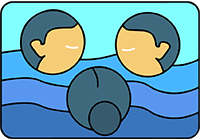
FAO reports that only 25% of the world catch comes from the numerically assessed stocks and the catch details from the Bay of Bengal region are riddled with inconsistencies, particularly due to the predominant small-scale multi-species fishery. The data on the fishing effort and catch are collected periodically by all the countries. However, the research studies on the stock status are not robust enough to influence the state policy on appropriate fisheries management.
Read More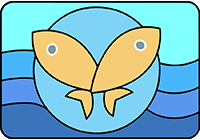
Capturing the Hidden Harvest: A Framework for Small-Scale Multi-Species Fishery
The objective of this multi-disciplinary programme is to assess and understand the vulnerabilities of artisanal and small-scale fisheries (ASSF) in the national and regional contextand evolve livelihood strategies to strengthen their adaptation and resilience. The ASSF constitutes the backbone of the marine fisheries sector of the Bay of Bengal region providing employment and food security in the coastal areas.
Read More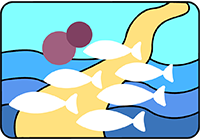
Blue Economy principles are identified by the member-countries to foster economic development in their respective countries. By nature, the blue economy is multi-sectoral and balancing is required to optimize the net gain from the activities while maintaining or sustainably enhancing ecosystem services. Such balancing requires investment in marine spatial planning, coastal zone development, and integration of ecosystem approaches.
Read More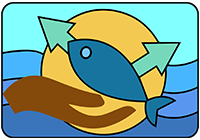
Back to Basics: Revitalising Traditional Knowledge for Sustaining Fisheries Future
BoB region has been a cradle of civilisation and the coastal fishing communities have nurtured and sustained arich pool of practical knowledge and skillsets honed over several centuries. Traditional knowledge and modern science have borrowed from and influenced each other, especially over the last two centuries. However, there is a need to further improve the documentation and deepen the understanding of the indigenous community-held knowledge related to fisheries. Modern science might still benefit from this appreciation and knowledge sharing.
Read More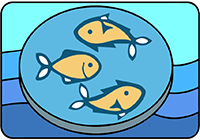
Aquaculture-Fisheries Co-development for Stock Enhancement and Sea Ranching
The Bay of Bengal region is a leading contributor to both aquaculture and fisheries. Increasing population, limited land resources, and depleting marine fish stocksin a changing climate scenario pose a serious challenge for the fisheries sector to provide adequate and affordable food and nutrition. Increasing operational costs may also drive the fishers and the farmers to poverty.
Read More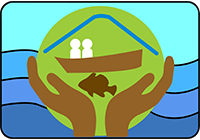
Insurance for Ameliorating the Climate Risks of Coastal Fishers of the Bay of Bengal Region
Small-scale and artisanal fisheries face major threat from the changing climate, the impacts of which include extreme weather events, migration of fishes to newer habitats, increase in the fishingban days, higher maintenance cost apart from actual loss of fishing assets, etc. Insurance is a risk-transfer and risk-pooling mechanism to compensate loss and damages from an adverse event. However, in the traditional insurance, natural calamities are usually treated as an “Act of God”. Hence, there is a need to make insurance climate-smart for building sectoral resilience.
Read More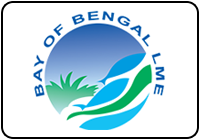
Bay of Bengal Large Marine Ecosystem Project
The Bay of Bengal (BOB) in the northern Indian Ocean is one of the 66 Large Marine Ecosystems (LMEs) of the World. The BOBLME Project funded by the GEF sought to address the issue of the sustainability of the BOBLME region through a regional cooperative framework. The first phase of the project implemented during 2009-15, identified four common areas of regional and national concerns viz.,overfishing, critical habitat degradation, pollution, and socio-economic challenges. A Strategic Action Programme (SAP) was developed which called for an institutional mechanism for addressing these problems through regional collective action.
Read More |
National Workshop on Strenthening the Science-Management Interface 09-10 Sep 2025 Read more... |
 |
FAO-BOBP-IGO TEAM HAD DEBRIEFED SRI LANKAN MINISTRY OF FISHERIES, AQUATIC AND OCEAN RESOURCES, Sri Lanka - 07.08.2025 Read more... |
 |
ENVIRONMENTAL LAW AND FISHERIES MANAGEMENT: A MASTERCLASS FROM PROF BHAT Read more... |
 |
5TH BOB MARITIME DIALOGUE CONCLUDES WITH A HIGH NOTE Read more... |
 |
BOBLME CONSULTATIVE WORKSHOP ON PREPARING EAFM PLAN IN PICHAVARAM HELD Read more... |
 |
BOBP AND FAO-RAP TEAM VISIT PICHAVARAM Read more... |
 |
NAAS BRAINSTORMING ON CLIMATE ADAPTIVE CONSERV ATIVE OF AQUATIC GENETIC RESOURCES Read more... |
 |
TEAM BOBLME VISITS FISHERIES MONITORING CENTRE OF THAILAND Read more... |
 |
BOBLME SECOND REGIONAL TECHNICAL COMMITTEE MEETING AND PROJECT STEERING COMMITTEE CONCLUDED IN BANGKOK Read more... |
 |
FISHERIES GEO-POLITICS IN SOUTH ASIA DISCUSSED AT IPFF-2024 Read more... |
Ideas unlimited!